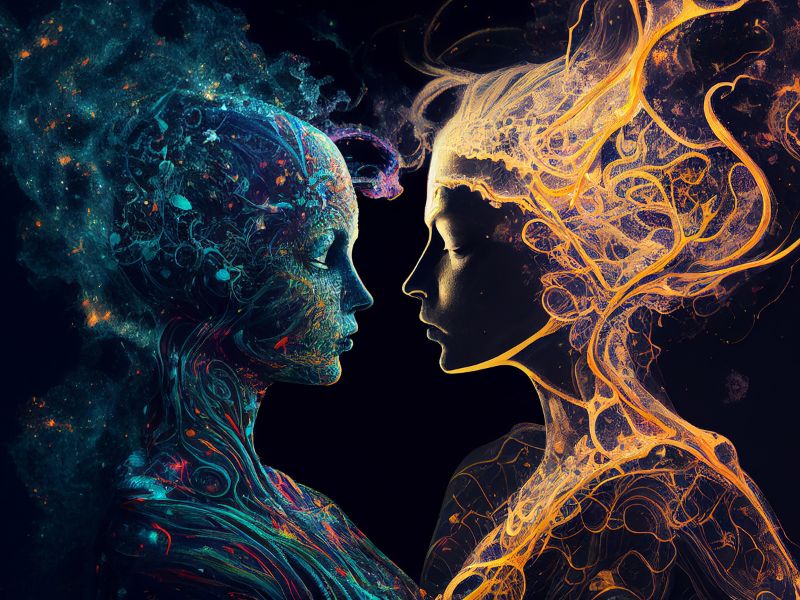Early the other morning, I heard a voice yelling my name. Repeatedly. I responded with an exasperated “What?” before my eyes opened to find myself lying in my bed, with my husband staring directly into my soul.

Naturally, I was creeped out—and I had questions: How long have you been staring at me? Do you always watch me sleep? Do I need to call security? As it turns out, apparently, my dream “what” had been clearly audible in this realm. I had woken him up.
I thought back to the voice in my dream. I didn’t recognize it. Who was it who wanted my attention? I tried to close my eyes tightly, hoping to return to the dream. I couldn’t. I spent the entire following day wondering who it was trying to get my attention. I’m still wondering.
I’ve always walked a tightrope through the physical plane and my dreamscape.
My dreams can be intense and often foretelling. I would not consider myself a psychic, though. I typically dream of small happenings that occur days or months later. However, the details are obscure enough in nature that they surpass what I’d consider coincidental.
One night I dreamed of a very specific box in a man’s hands. The man was facing away from me and tinkering with it. I couldn’t identify the man from my vantage point. A few months later, my brother visited and brought out a cigarette rolling machine. It just so happened I was standing behind him at the time.
My prior dream and my current reality synced at this moment. Déjà vu.
What Are Dreams?
The mystery of dreams has always fascinated me. Dreams themselves are simply images and storylines that play in our minds as we sleep. However, what is most mysterious about them is not what dreams are but rather why we dream in the first place.
According to Cleveland Clinic’s article, “What Do Dreams Mean?” psychologists Sigmund Freud and Carl Jung both took a swing at determining this. Freud proposed that dreams were repressed content throughout our day, whereas Jung attributed them to the collective unconscious.
To this day, the jury is still out.
Dreams can occur at any stage of sleep but are most vivid during REM sleep or rapid-eye-movement sleep. According to an article from the Sleep Foundation, REM sleep earned its name in the 1950s. Scientists were studying sleeping infants when they noticed periods when their eyes moved rapidly from side to side. During this stage of sleep, our brains are highly active—as are our eyeballs. Due to this observation, we now refer to this stage as REM sleep.
In this stage, our dreams could serve the purpose of processing our emotions because our amygdala activates during REM sleep. The amygdala, named for its almond shape, regulates emotions and memory formation—particularly emotional memories. So, during this portion of the process, our brains could potentially be running a system defrag.
What Do They Mean?
While theories abound, there still isn’t a conclusive answer as to why we dream or why we dream what we dream.
Dreams and their symbolism are highly individualized. However, there are several common themes amongst dreamers, such as showing up naked, falling, or losing teeth. Often these dreams are said to be indications of anxiety and insecurities. Where the individualization comes in is the root cause of these anxieties. Are we stressed at work? Are there problems in our relationships? Assessing our lives objectively allows us to uncover the personalized meanings of these dreams.
While several 101 dream books assign meanings to common themes and characters in dreams, I prefer a different approach. Instead, I like to assess my feelings about the situation and encourage others to do the same.
Rather than asking ourselves, “What did the rabbit in my dream mean?” we should ask ourselves what it means to us. Do you view rabbits as docile and agile creatures? Or do you think of that terrified rabbit that clawed you to bits as a child when you tried to Elmyra it?
Perspective matters.
Pay attention to how your dream made you feel. Think of the setting and the key details. Were you worried? Were you excited? These seemingly small factors color how you can interpret your dream and discern its significance.
Dreams & Spirituality
As much as I respect science, I recognize its limitations. Science cannot explain why we exist, let alone why we dream. There are concepts outside its scope. Often, this is where spirituality and religion step in.
In my practice, sleep is a portal to another realm. Dreams are a place where we exist beyond our physical bodies. Therefore, they hold a great deal of significance.
Listed below are some of the methods I use to unite my spirituality with my dream world.
Dream Journal
One of the most crucial steps to utilizing our dreams is recording them. We often remember a portion of our last dream before waking, but we can train ourselves to remember more.
It’s a good idea to keep a notepad by your bedside. When you wake up, jot down what you can remember. Don’t worry if it’s nonsensical. This process will allow you to recall more details from the dreams and may even allow you to cycle back into earlier dreams. As the details emerge, jot those down as well.
This book will become your dream journal and a portrait of a landscape that only you are privy to.
Divining Messages
Incidents such as the mystery box have happened throughout my life often enough that I do my best to pay attention to my dreams and record them. What other proverbial easter eggs can we uncover in our minds?
The details gathered in your dream journal will allow you to cultivate a relationship with your unconscious. Not only that, but you will have a handy log of predictions by your side.
See if your dream world and your waking world ever collide. I’d be willing to bet they do.
Often after recording our dreams and going about our days, an incident that occurs in our waking life will mirror an aspect of our dreams and trigger a new memory. The parallels between our conscious and subconscious life become more apparent as we pay attention.
See if you spot any patterns between the two worlds, and as you do, consider what this is trying to show you.
Lucid Dreaming
Lucid dreaming is a favorite pastime of mine. In order to lucid dream, we first have to realize that we are dreaming while we are dreaming.
For myself, when things are too out of bounds in my dreams—and I’m growing suspicious—I pinch myself. If I don’t feel it, I know that it’s game time. The possibilities are endless. Ever dream of flying around like a superhero? The time to act is now.
Admittedly, while this type of dreaming is fun, it can be a spiritual experience, too. When we experience lucid dreaming, we have nexus in multiple realms. Namely, the unconscious and the conscious. This allows us to have an otherworldly experience in which we can interact with the world around us in an entirely new way.
In essence, we are free of our physical bodies and, almost by default, one step closer to divinity.
















